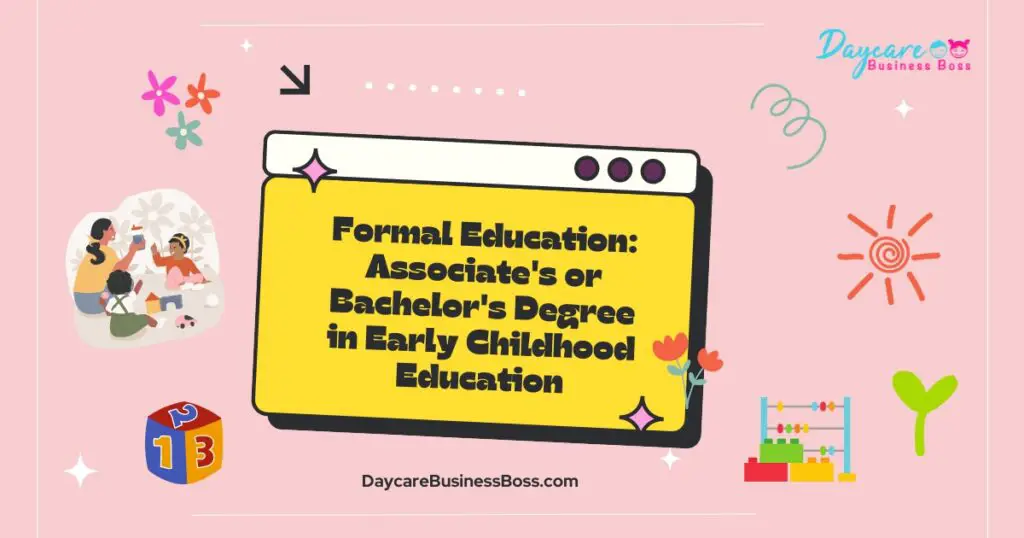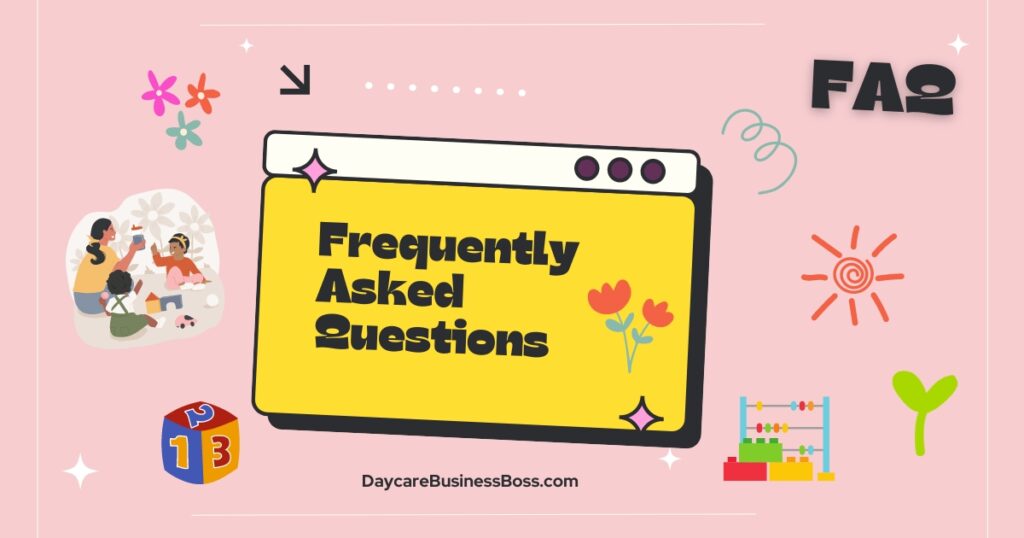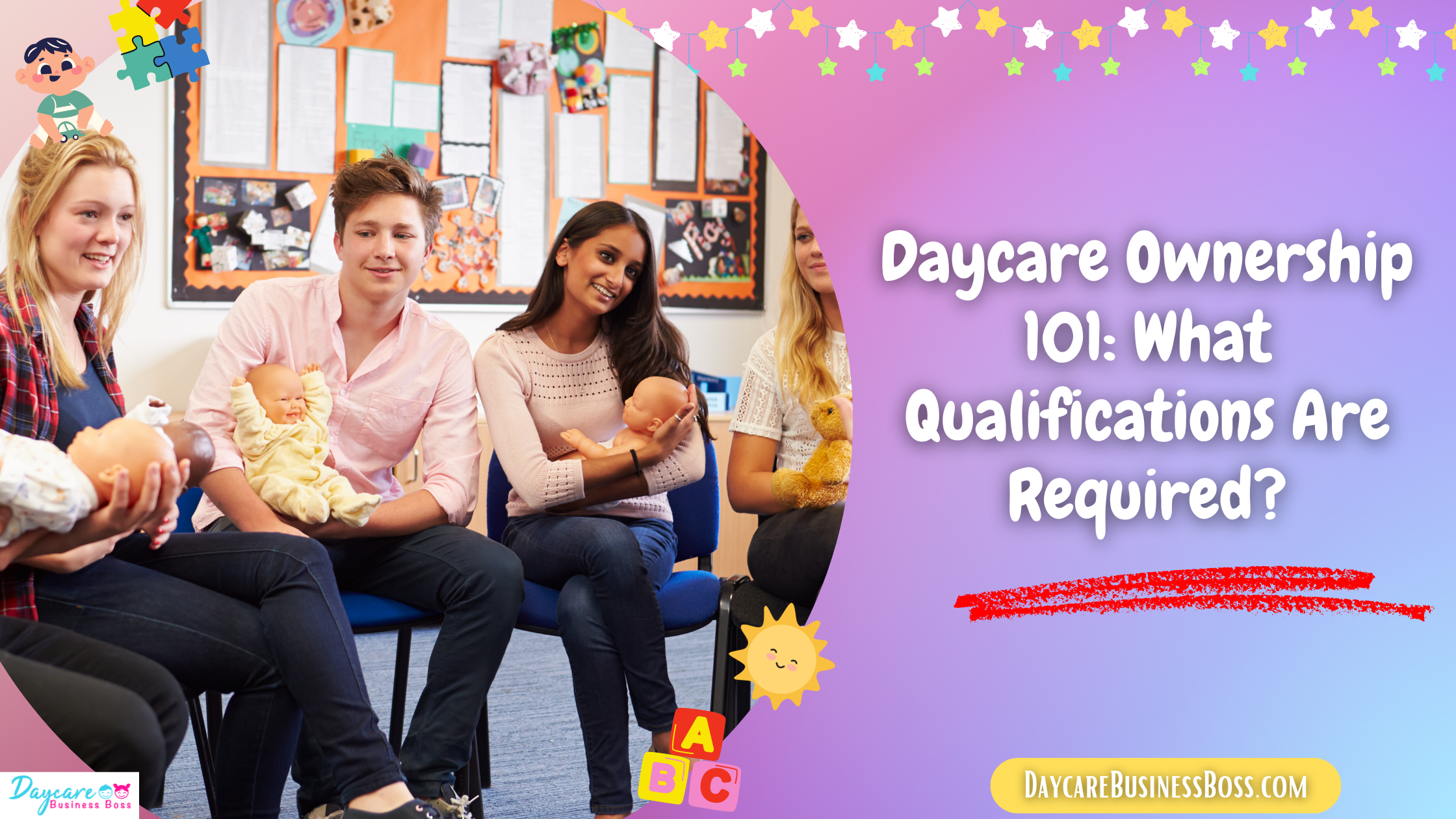Many people who are passionate about promoting the growth and development of young minds aspire to open a daycare. Aspiring daycare operators are frequently motivated by a desire to provide a secure and caring environment for children while also giving back to the community. However, starting your daycare comes with its own set of problems and requirements. One of the most important factors to consider is the educational background and expertise required for this venture.
To open your daycare, the specific degree required varies by region and licensing regulations. However, many jurisdictions recommend or require an associate’s or bachelor’s degree in Early Childhood Education or a related field. Practical experience and relevant certifications can be just as vital as formal education.
Varying Degree Requirements: Region and Licensing
Opening a daycare is not a one-size-fits-all operation; it is greatly influenced by the varied landscapes of legislation and jurisdictional boundaries. The road to opening your daycare requires a thorough awareness of the nuances that govern each region and locality. The specific degree or educational qualifications required for this effort can vary greatly depending on the subtleties of local rules and licensing requirements. Whether your dreams are set in a bustling urban hub or a tranquil suburban enclave, the web of regulations has a significant impact on the educational criteria that lay the groundwork for your childcare venture.
The landscape of criteria for the childcare business varies in surprising ways across different locations. Some areas have rigorous requirements, such as requiring daycare operators to have a bachelor’s degree in Early Childhood Education. This requirement attests to these regions’ sincere commitment to upholding a standard of professionalism and expertise in the childcare sphere. Such rules ensure that childcare operators have a thorough understanding of child development theories, pedagogical practices, and curriculum design. This knowledge translates into enhanced learning experiences for the children in their care, laying the groundwork for comprehensive cognitive, emotional, and social development.
Other places, on the other hand, take a more flexible approach, with more lenient educational requirements. These areas may require an associate’s degree in Early Childhood Education as a prerequisite. In some situations, the need may be limited to a relevant certification, acknowledging that practical experience and specialized training can both be transformative in building a supportive and educational atmosphere. These guidelines’ flexible outlines recognize the variety of approaches that might lead to excellent childcare provision.
The wide range of educational requirements demonstrates the importance of extensively familiarizing oneself with the regulatory landscape of the prospective operating place. Before commencing this adventure, it is critical to familiarize oneself with the complexities of local rules. The strictness or laxity of these mandates can influence the direction of your daycare ambitions. Careful research and a grasp of the current standards enable aspiring daycare owners to fit their educational ambitions with the requirements of their chosen field.
Read more about: How to Open a Daycare in Florida (The Ultimate Beginner’s Guide)
Formal Education: Associate’s or Bachelor’s Degree in Early Childhood Education

The degree requirements emerge as a main point of attention within the intricate mosaic of daycare laws. While specific mandates vary by jurisdiction, a prevalent trend emerges in which a significant number of regions promote or require formal education in the realm of Early Childhood Education. This emphasis on education stems from a deep understanding that a well-structured and exciting early education can profoundly alter a child’s cognitive, emotional, and social development, laying the groundwork for a lifelong journey of learning.
The pursuit of associate’s or bachelor’s degrees in Early Childhood Education is frequently the cornerstone of formal education in the subject. These educational paths are intended to educate future childcare owners with a thorough understanding of the complexities of child development. Aspiring daycare owners obtain a thorough understanding of the systems that regulate the development of young minds by digging into the labyrinthine complexities of child psychology, behavior, and learning patterns.
These degrees act as a furnace in which theories and research findings are transformed into practical solutions for effective teaching and curriculum building. With this understanding, daycare operators are better prepared to orchestrate enriching learning experiences that go beyond rote instruction. The use of evidence-based teaching strategies creates an environment in which investigation and inquiry are not only encouraged but also appreciated.
However, the relevance of these degrees extends beyond pedagogical ability. They act as a powerful channel for instilling professionalism into daycare operations. A well-qualified daycare operator exudes dedication and expertise, which is felt not only by the children in their care but also by their parents and caregivers. The pursuit of formal education conveys a clear message that the childcare operator is committed to delivering care that goes beyond the surface, evoking trust and reliability.
When parents leave their most precious loved ones to daycare providers, they look for assurance in the professionalism and experience of the caretakers. An associate’s or bachelor’s degree in Early Childhood Education serves as a beacon, revealing the operator’s dedication to the well-being and overall development of children. This professional resonance instills confidence in parents, building a partnership based on shared goals for the child’s development and achievement.
Practical Experience and Relevant Certifications
While formal education is unquestionably important, it is also important to recognize that the fabric of growth in the daycare business is carefully woven with strands of practical experience and applicable qualifications. These aspects, which are frequently overlooked in the shadow of academia, are critical in cultivating a complete and effective childcare environment.
Practical experience demonstrates the adage that true learning occurs not only in classrooms but also in the vivid tapestry of real-world interactions. While textbooks and lectures can give a foundation, they can only supply a fraction of the insight gained via hands-on experience. Direct contact with children in a childcare setting is an unrivaled voyage into the complexities of their needs, behaviors, and learning styles for aspiring daycare providers.
The concrete contacts with young minds serve as a blank canvas for ambitious daycare providers to construct a realistic picture of children’s developmental paths. They realize the nuances that textbooks cannot explain – the unwritten language of a child’s expression, the complexities of their relationships, and the myriad of ways in which learning unfolds in the most unexpected corners – during these times. This immersion in the world of children provides a wealth of knowledge that enhances the tactics used to create an engaging and loving environment.
However, practical experience is not the only light that illuminates the route to good childcare administration. Relevant certifications emerge as another critical pillar. Certifications like the Child Development Associate (CDA) or CPR and First Aid training are more than just checks on a list; they represent a strong dedication to the welfare of the children in their care.
For example, the Child Development Associate degree demonstrates a thorough understanding of child development concepts and best practices. CDA holders have shown a commitment to honing their skills and ensuring that their caregiving techniques are grounded in evidence-based knowledge. Similarly, CPR and First Aid certifications go beyond the realm of formality; they are lifesavers. These qualifications emphasize the preparedness to respond to emergencies and the vow to protect the safety and well-being of every kid inside the daycare’s embrace.
These credentials are valued by regulatory organizations in addition to their inherent value. They are frequently required for licensure and serve as indicators of a daycare facility’s adherence to the highest standards of care. The presence of these credentials reassures parents and caregivers looking for a safe place for their children. They are a visible representation of the childcare operator’s dedication to providing a nurturing and secure environment.
Balancing Education and Experience
The dynamic interaction between education and hands-on experience serves as the foundation for a well-rounded daycare operator. This complex interweaving of academic knowledge and practical insight creates a tapestry of competence that improves the quality of care and education given. While education provides a solid basis, experience brings these ideas to life, ultimately improving the daycare environment for both caregivers and the children they care for.
A degree in Early Childhood Education provides childcare operators with a comprehensive arsenal of theoretical knowledge and pedagogical approaches. This educational journey looks deeply into child development theories, effective teaching practices, and curriculum design. With these insights, daycare providers can employ a set of evidence-based approaches that will establish the framework for a vibrant learning environment.
The educational journey does not end with mastery; it is a lifelong adventure of learning. A well-educated daycare operator stays up to date on the newest breakthroughs and trends in the field of child development. The commitment to continual education guarantees that the approaches used are not static, but rather constantly growing to meet the changing requirements and dynamics of the young brains they foster.
However, knowledge alone is insufficient without the addition of hands-on experience. Practical contacts in a daycare setting provide an opportunity to bridge the theoretical and practical divide. As daycare operators traverse the intricate maze of real-world events, instruction translates into action. This hands-on experience refines the application of theoretical principles, revealing the nuanced complexities that textbooks frequently overlook.
The essential value of practical experience is its ability to foster adaptation. Children are the canvas on which practical wisdom is painted, with their diverse personalities, learning methods, and quirks. Experience sharpens daycare operators’ ability to respond to the particular requirements of each child as they manage the delicate mix of nurturing and instructing. This adaptability guarantees that the learning environment remains dynamic and responsive, allowing children to grow as individuals.
The synergy created by the harmonic combination of education and experience propels the daycare environment to new heights. The organized foundation of education is energized by the lessons learned from experience, resulting in a platform that is both informed and adaptive. Within this ecosystem, learning goes beyond simple instruction. Each child’s unique needs, abilities, and interests are recognized and celebrated, producing an environment in which education is not only given but personalized to each child’s unique journey of discovery.
Read more about: Daycare Economics: Monthly Financial Projection and Cost Insights
Frequently Asked Questions

What are the normal educational prerequisites for starting a daycare?
The degree required to run a daycare can vary greatly based on your region and local licensing restrictions. While an associate’s or bachelor’s degree in Early Childhood Education or a similar discipline may be recommended or required in some places, others may have more liberal criteria, such as applicable certificates or a combination of education and experience. To ensure compliance with the relevant credentials, it is critical to investigate and understand the specific legislation that applies to your target area.
How crucial is formal Early Childhood Education education for running a daycare?
In the daycare profession, formal education in Early Childhood Education is quite important. A degree in this discipline will provide you with a strong foundation in child development theories, effective teaching practices, and curriculum building. It improves your capacity to provide a stimulating and nurturing learning environment that promotes cognitive, emotional, and social growth in children. A degree also instills professionalism and credibility, reassuring parents and caregivers about the level of care their children will get at your childcare facility.
What role does practical experience play in efficiently running a daycare?
Practical experience is essential for efficiently running a daycare. While formal education provides theoretical knowledge, practical experience dealing with children brings insights that textbooks cannot. Direct engagement with children allows you to better understand their individual needs, behaviors, and learning styles, allowing you to modify your approach to match their specific demands. Practical experience also improves your adaptability and problem-solving abilities, allowing you to effectively manage issues in a childcare context. Experience in the industry can help you create trust with parents by demonstrating your abilities to care for and teach their children.
To learn more on how to start your own daycare checkout my startup documents here.
The information provided by DaycareBusinessBoss.com (“The Site”) is for general informational purposes only. All information on the Site is provided in good faith, however, we make no representation or warranty of any kind, express or implied, regarding the accuracy, adequacy, validity, reliability, availability or completeness of any information on the Site. Under no circumstance shall we have any liability to you for any loss or damage of any kind incurred as a result of the use of the Site or Reliance on any information provided on the Site. Your use of the Site and your reliance on any information on the Site is solely at your own risk.
This blog post is for educational purposes only and does not constitute legal advice. Please consult a legal expert to address your specific needs. Terms and Conditions. (https://daycarebusinessboss.com/terms-conditions/)

Meet Shawn Chun: Entrepreneur and Childcare Business Fan.
I’m a happy individual who happens to be an entrepreneur. I have owned several types of businesses in my life from a coffee shop to an import and export business to an online review business plus a few more and now I create online daycare business resources for those interested in starting new ventures. It’s demanding work but I love it. I do it for those passionate about their business and their goals. That’s why when I meet a childcare business owner, I see myself. I know how hard the struggle is to retain clients, find good employees and keep the business growing all while trying to stay competitive.
That’s why I created Daycare Business Boss: I want to help childcare business owners like you build a thriving business that brings you endless joy and supports your ideal lifestyle.

